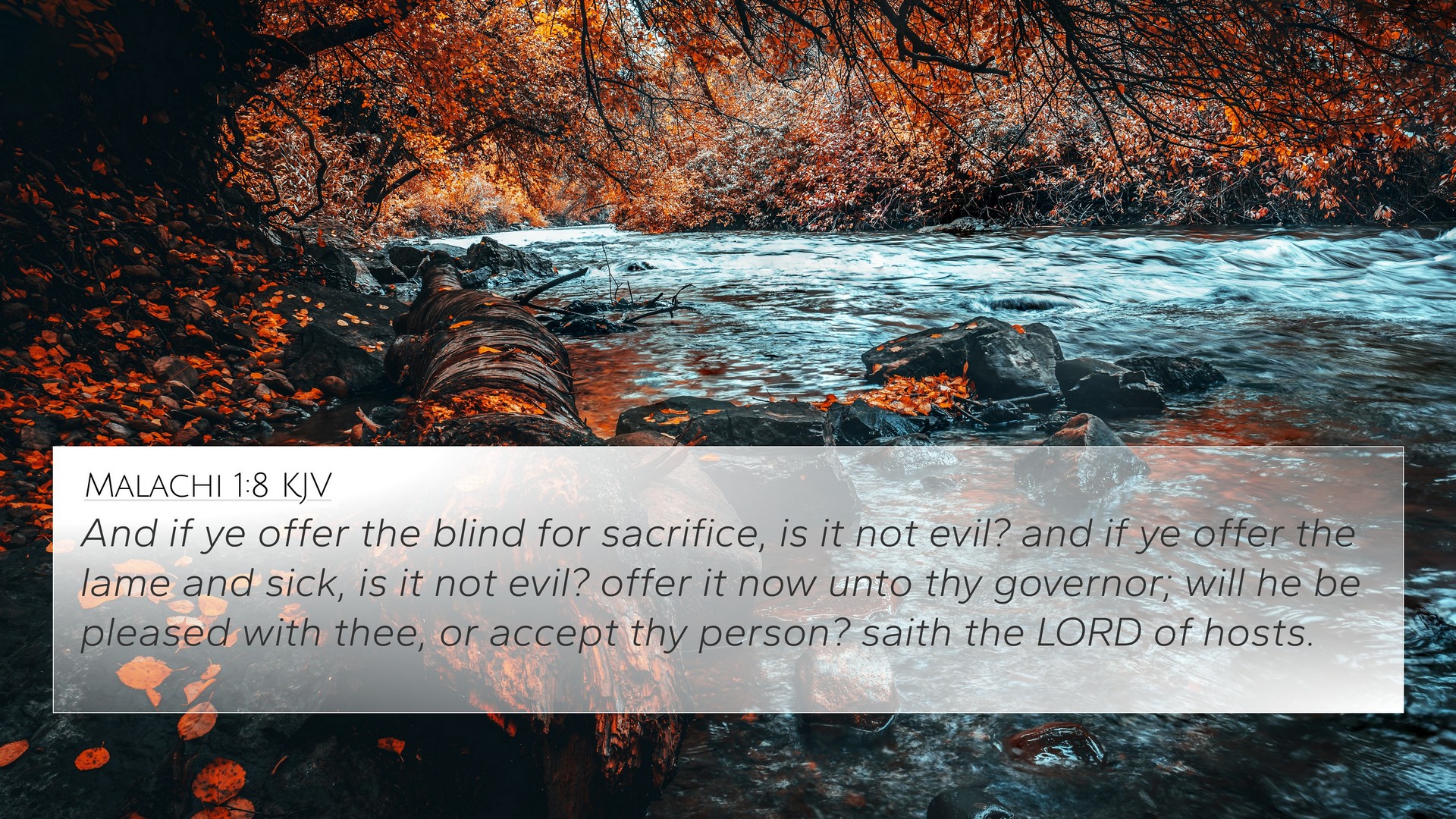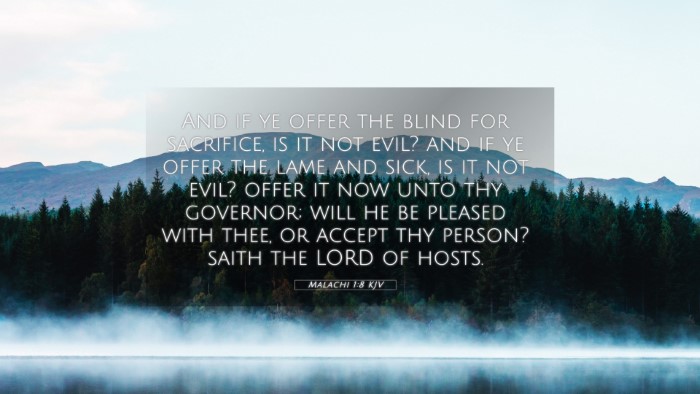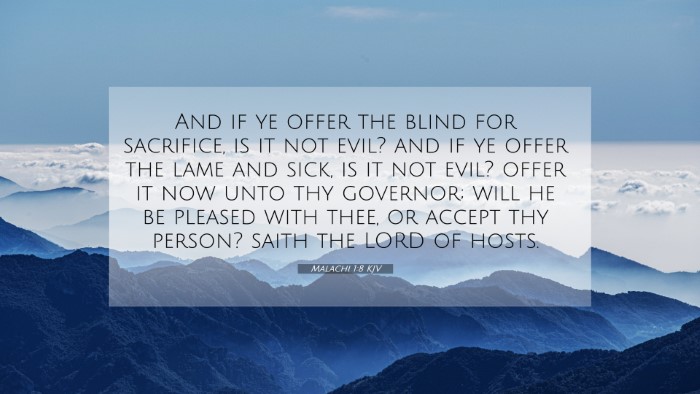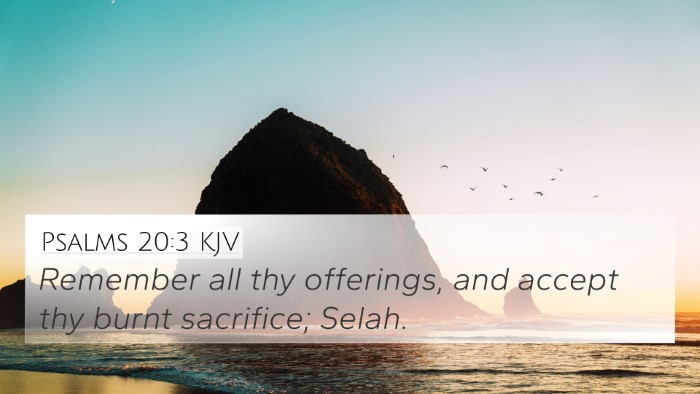Old Testament
Genesis Exodus Leviticus Numbers Deuteronomy Joshua Judges Ruth 1 Samuel 2 Samuel 1 Kings 2 Kings 1 Chronicles 2 Chronicles Ezra Nehemiah Esther Job Psalms Proverbs Ecclesiastes Song of Solomon Isaiah Jeremiah Lamentations Ezekiel Daniel Hosea Joel Amos Obadiah Jonah Micah Nahum Habakkuk Zephaniah Haggai Zechariah MalachiMalachi 1:8 Similar Verses
Malachi 1:8 Cross References
And if ye offer the blind for sacrifice, is it not evil? and if ye offer the lame and sick, is it not evil? offer it now unto thy governor; will he be pleased with thee, or accept thy person? saith the LORD of hosts.
Uncover the Rich Themes and Topics of This Bible Verse
Listed below are the Bible themes associated with Malachi 1:8. We invite you to explore each theme to gain deeper insights into the Scriptures.
Malachi 1:8 Cross Reference Verses
This section features a detailed cross-reference designed to enrich your understanding of the Scriptures. Below, you will find carefully selected verses that echo the themes and teachings related to Malachi 1:8 KJV. Click on any image to explore detailed analyses of related Bible verses and uncover deeper theological insights.
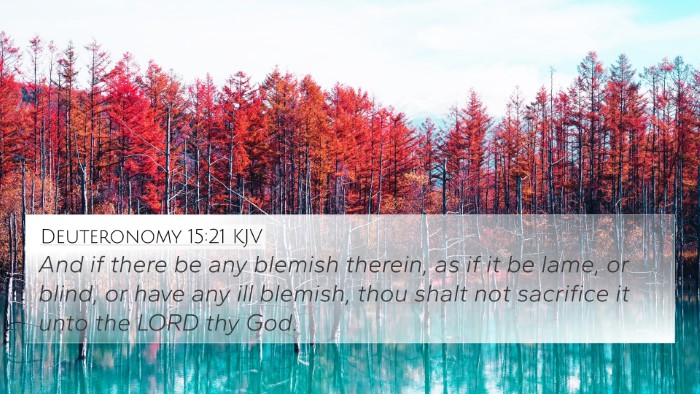
Deuteronomy 15:21 (KJV) »
And if there be any blemish therein, as if it be lame, or blind, or have any ill blemish, thou shalt not sacrifice it unto the LORD thy God.
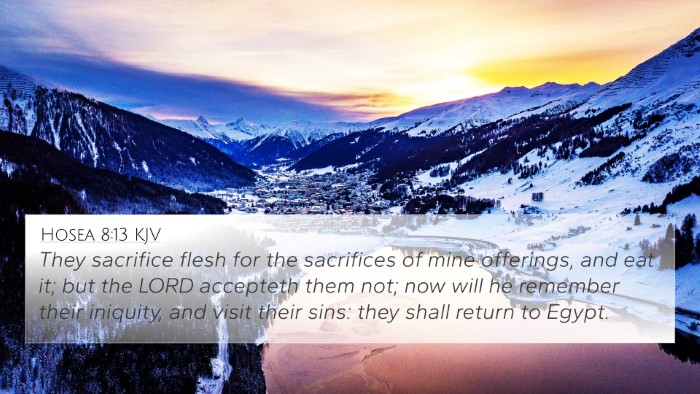
Hosea 8:13 (KJV) »
They sacrifice flesh for the sacrifices of mine offerings, and eat it; but the LORD accepteth them not; now will he remember their iniquity, and visit their sins: they shall return to Egypt.
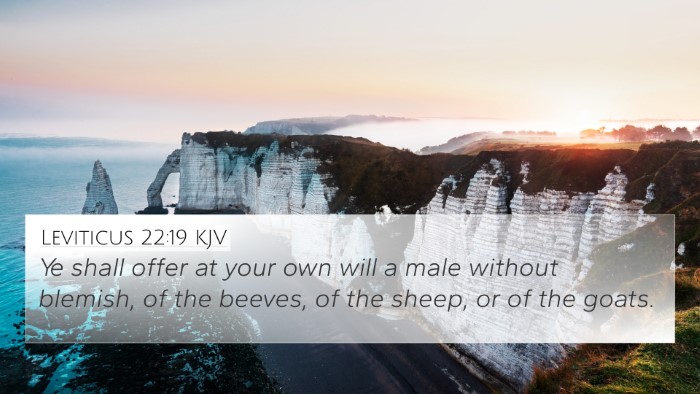
Leviticus 22:19 (KJV) »
Ye shall offer at your own will a male without blemish, of the beeves, of the sheep, or of the goats.

Job 42:8 (KJV) »
Therefore take unto you now seven bullocks and seven rams, and go to my servant Job, and offer up for yourselves a burnt offering; and my servant Job shall pray for you: for him will I accept: lest I deal with you after your folly, in that ye have not spoken of me the thing which is right, like my servant Job.
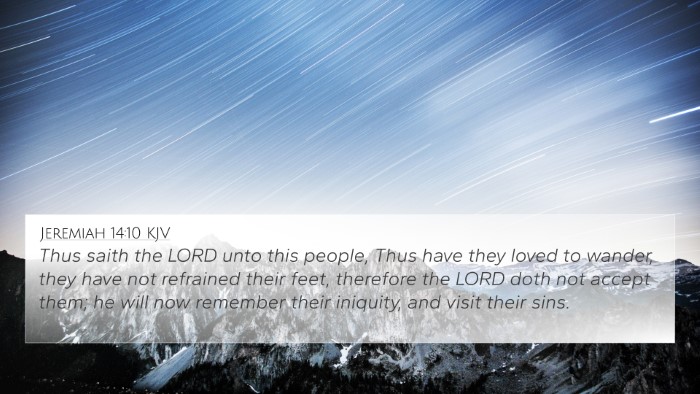
Jeremiah 14:10 (KJV) »
Thus saith the LORD unto this people, Thus have they loved to wander, they have not refrained their feet, therefore the LORD doth not accept them; he will now remember their iniquity, and visit their sins.

Malachi 1:13 (KJV) »
Ye said also, Behold, what a weariness is it! and ye have snuffed at it, saith the LORD of hosts; and ye brought that which was torn, and the lame, and the sick; thus ye brought an offering: should I accept this of your hand? saith the LORD.

Malachi 1:10 (KJV) »
Who is there even among you that would shut the doors for nought? neither do ye kindle fire on mine altar for nought. I have no pleasure in you, saith the LORD of hosts, neither will I accept an offering at your hand.
Malachi 1:8 Verse Analysis and Similar Verses
Understanding Malachi 1:8
Verse: Malachi 1:8 - "And if you offer the blind for sacrifice, is it not evil? and if you offer the lame and sick, is it not evil? offer it now unto thy governor; will he be pleased with thee, or accept thy person? saith the LORD of hosts."
Summary of Malachi 1:8
Malachi's message serves to highlight the people's neglect and disdain towards God through their unacceptable offerings. This verse calls attention to the seriousness of sacrificial offerings and raises questions regarding the sincerity and quality of what is brought to God.
Commentary Insights
Matthew Henry's Commentary
Matthew Henry emphasizes the principle that the offerings presented to God are a reflection of our respect and reverence toward Him. By offering blind and lame animals, the people are essentially presenting their worst to God, which he interprets as an act of dishonor. He indicates that if such offerings were presented to an earthly governor, they would never be accepted, implying how much more God deserves better.
Albert Barnes' Notes
Albert Barnes expounds on the idea of worthiness in offerings. He suggests that God demands quality and devotion, and the people’s lapse into giving inferior sacrifices shows a lack of love and commitment. Barnes compares the triviality of their offerings to the expectations of a human leader, suggesting a stark reminder of the reverence due to God.
Adam Clarke's Commentary
Adam Clarke expands on the consequences of such inadequate offerings. He describes the implications of presenting a sacrifice that is unworthy and suggests that it reflects an overall spiritual malaise among the people. Clarke stresses the need for genuine worship, noting the expectation that any offering made to God should come from a place of sincerity and faithfulness.
Cross-References to Malachi 1:8
- Leviticus 22:20-22: Calls for without blemish in animal sacrifices.
- Deuteronomy 15:21: Command concerning the quality of sacrificial animals.
- Isaiah 1:11-13: God expresses disdain for sacrifices made without true intention.
- Jeremiah 7:21-23: Message on obedience over sacrifices.
- Romans 12:1: Presenting our bodies as living sacrifices, holy and acceptable.
- Matthew 5:23-24: Importance of reconciliation before offering gifts at the altar.
- Hebrews 13:16: Doing good and sharing as sacrifices that please God.
- 1 Samuel 15:22: God prefers obedience over sacrifices.
- Micah 6:6-8: What does the Lord require but justice, mercy, and humility?
- 2 Corinthians 9:7: God loves a cheerful giver.
Thematic Connections
Malachi 1:8 exhibits several critical themes within Scripture:
- Quality of Worship: This ties to themes found in Leviticus 22 which emphasizes offering the best to God.
- Obedience vs. Sacrifice: Found in 1 Samuel 15 and Isaiah 1, these scriptures stress the need for heartfelt devotion.
- The Heart of Giving: Seen in 2 Corinthians 9, which underlines the attitude of the giver as more significant than the gift itself.
Conclusion
Malachi 1:8 serves as a substantial reminder of our approach to God and our offerings of worship. It urges believers to examine their hearts and the quality of their offerings, aligning every act of worship with genuine reverence. The connections drawn to other scriptures amplify this message, showing it to be a recurring theme of honor, respect, and sincerity in worship throughout the Bible.
